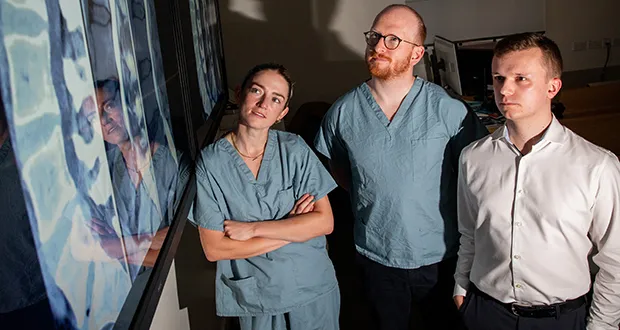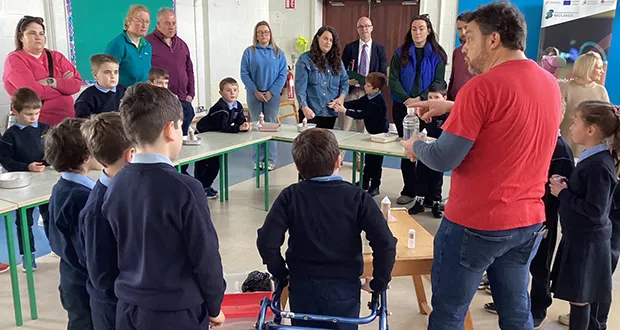Dr Leslie O’Looney , 2025-06-24 07:30:00
Welcome to this week’s issue of The Week in Medicine – a round-up of all the happenings in the world of Irish medicine
Kudos to the Mater Hospital on becoming the first hospital in Ireland to establish a Centre for AI and Digital Health. Ireland still lags well behind other similar countries in terms of digital development, but perhaps the tech of Artificial Intelligence (AI) will allow us to catch up.
The new hub will bring not just new diagnostic solutions, but also apply AI solutions to every aspect of the functioning of the hospital. And it’s something that IMT agrees with strongly. For a relatively small investment, AI can transform labour-intensive tasks – such as the current practice of nurses searching through patient files looking for potential subjects for clinical trials.
AI can do that job quicker and much more effectively, leaving the nurses free to focus on their core duties. AI can reduce ED waiting times, assist in diagnostics, and automate tasks as above, but the proof of AI adoption will be in the achievement pudding.

Dr Leslie O’Looney, as envisaged by AI
That brings up the question of how AI is going to be used across the whole of the healthcare system, and whether or not the system of voluntary hospitals and autonomous units within the healthcare system is even viable anymore?
Naturally, we are delighted to see such progress at the Mater, but while such initiatives are brilliant for them, there is no defined pathway for this technology to make its way into other hospitals, as it would if all hospitals were part of the same system.
We must ask ourselves the question of whether or not it is practical and efficient – not to mention safe – for the Minister for Health to helicopter-manage a system where some institutions are actively competing with each other for patients and prestige, and many institutions – such as CHI – seem to be beyond any effective control.
For example, the synthetic spinal imaging project in the Mater, which has developed a generative AI that can convert lumbar spine CT images into synthetic MRI images is the type of advance that should be extended to every hospital as soon as practical.
Another massive benefit is the enhancement of ECG scans which could be life-saving tech. Mater Consultant Cardiologist Prof Joe Galvin told me: “AI has the potential to enhance the accuracy of ECG and radiology scan analysis, reducing the time that a patient has to wait for the results of their diagnosis and, if required, starting their treatment sooner. If a patient suffers from cardiovascular disease, stroke or cardiac arrest, every minute counts. AI’s ability to increase accuracy and speed may be life-saving.”

Pictured at the official launch of the Mater Hospital’s Centre for Artificial Intelligence and Digital Health are, L-R: Siobhan Killeen, radiographer, Dr Edward McDermott, registrar radiologist, and Paul Banahan, Senior AI Research Fellow from the Mater Hospital. Photo: Gareth Chaney
Which is fantastic. No-one would argue against that. But how soon will it be before that tech is in Wexford Hospital? Or Letterkenny?
None of this is the fault of the Mater. They have marched ahead and are achieving great things, we are told. In the Mater’s Radiology department, for example, AI is assisting in the rapid notification of suspected pathologies, like stroke and fractures, which are being correctly flagged by AI within 2-3 minutes of the scan being completed, with an accuracy rate of over 90 per cent.
Mater Hospital Consultant Radiologist Prof Peter MacMahon said, “Our experiences have underscored the tangible benefits of AI, notably in expediting critical diagnoses and reducing turnaround times by rapidly flagging anomalies detected in scans.”
The doctors are still making the decisions, of course. AI is a tool, like any other. And again, the Mater deserves kudos for driving ahead with AI innovations and efficiencies, but how much better would it be if their success was automatically extrapolated to all hospitals in Ireland?
That’s a question for a Minister who has no fear of land-mines.
***************
An ancient Greek man walks into his tailor’s shop with a pair of pants.
“Euripides?” says the tailor.
“Yeah, Eumenides?” replies the man.
***************
Children with autism in Co Laois are part of a ground-breaking initiative to explore science, technology, engineering and maths (STEM) in a way that nurtures their strengths.
Free workshops are being rolled out across the county, bringing the subjects to life for kids with autism and special educational needs. The initiative is being showcased as part of #YourCouncil Day on Friday (June 27), which highlights the role of county and city councils in supporting people.
Seanie Morris, STEM Engagement Officer with Laois County Council, has developed the programme, which has already been delivered to children in the ASD units of St Fergal’s College, Rathdowney, Portlaoise College and St Joseph’s National School in Ballyadams.

Seanie Morris, STEM Engagement Officer with Laois County Council, talks to students from St Joseph’s NS Ballyadams at their STEM Showcase on Autism Awareness Day as part of a new STEM initiative being delivered to children in ASD units
These involved two-hour sessions in the schools where students built a robot car from scratch and then learned how to drive it, as well as creating ‘pop’ rockets and learning about astronomy.
“School and education is not only about learning skills, facts and numbers, but also about having fun and building their own personalities.
“Sometimes, something extra is needed to help them along the way. Maybe it’s sports, which every school automatically has a focus on, but not every kid is sporty.
These and similar concurrent STEM programmes are part of the Midlands Regional Enterprise Plan ‘Pathway for Transition’, co-funded by the Government of Ireland and the European Union through the EU Just Transition Fund Programme 2021-2027.
This Project is an initiative of the Local Authorities of the Midlands region, comprising Laois (lead partner), Longford, Offaly and Westmeath.
***************
A guy walks into a bar and sees three pieces of meat hanging from the ceiling. He asks the bartender “What’s all this about?”
The bartender replies: “Well, if you jump up and slap the meat, you get free drinks for the rest of the night. If you miss, you pay for everyone else’s drinks for the next hour. You wanna giver it a go?”
The guy replies: “Nah, the steaks are too high.”

